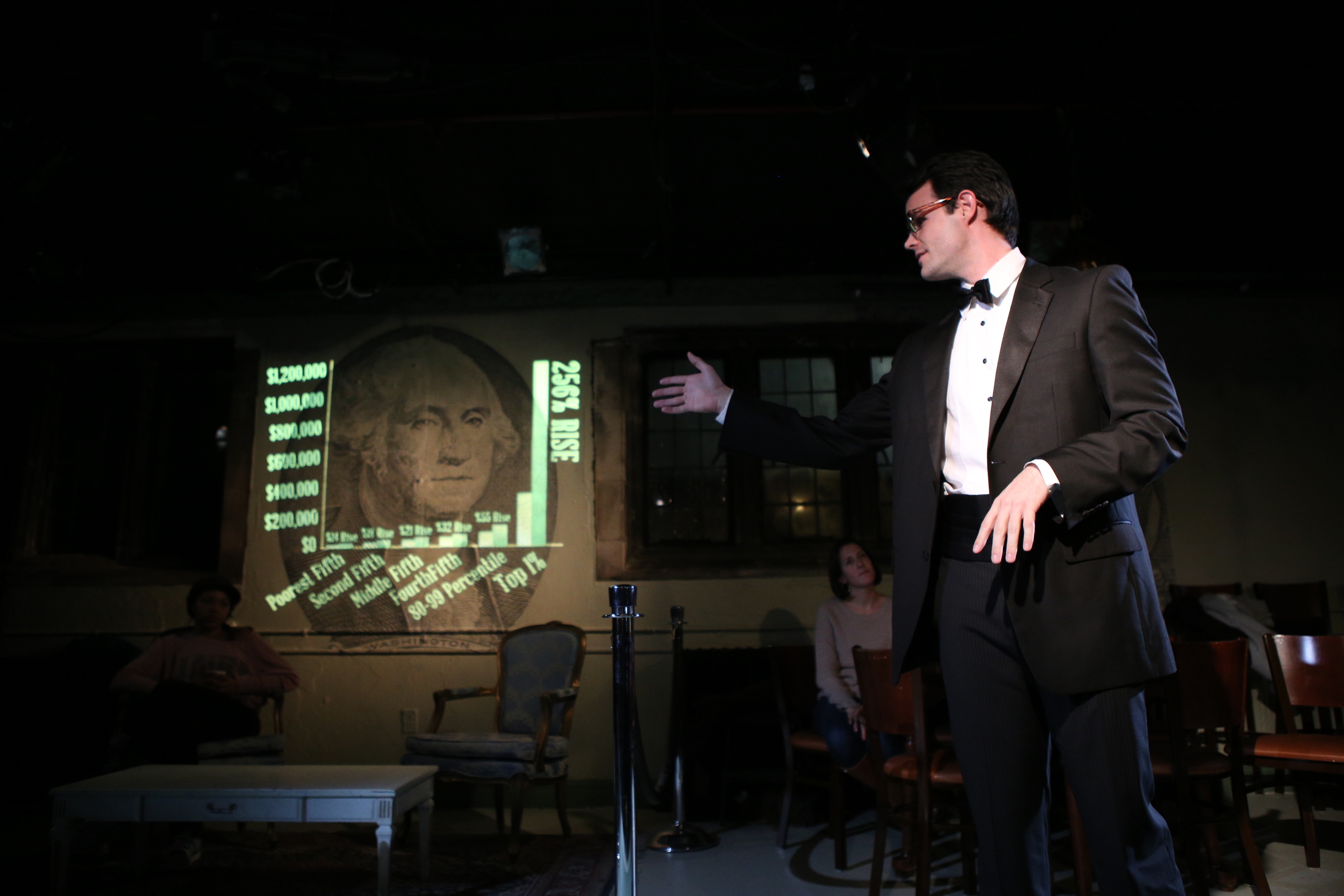“Derivative” is an interesting word. Its base—“derive”—refers to the act of using some source as the basis for something else. Our language’s ability to make noun forms of verbs gives us the “thing”: “a derivative.” In economics, a derivative is a financial product that is based on some other financial product. Recently, when the housing bubble broke, the credit and holdings derived from faulty mortgages and other bad debt nearly brought banking to its knees. But there are other meanings. When we say a theater-piece is “derived” we mean it doesn’t start with a script but rather ends with a script; it’s worked out as the rehearsals progress. We can also mean that its source is something else: an existing play or some other work. In the case of Derivatives, the Yale Cabaret show conceived by YSD acting student Jabari Brisport and directed by third-year director Cole Lewis, the show is derived from interviews with the regular folk of New Haven. The show’s purpose is to give us, on the one hand, a snapshot of the economic realities in downtown, and, on the other, to take pot-shots at our wider culture of political double-talk, disparity and, the key term, “economic inequality.”

Let’s start with the fun stuff. The show features a number of lively take-offs of the type that Saturday Night Live is famous for: it’s like TV but in some more madcap version where “the truth” actually comes through. So, whether it’s two blonde sistahs (Cornelius Davidson and Brisport) telling you that you too can be like Obama—just use hope—or an earnest cooking-show host (Tanya Dean) telling you how to make Doritos the basis of your cuisine, or a heartfelt paean to the losses incurred by CEOs in the economic slump, the comedy segments—while ‘derivative’ in yet another meaning of the term—had more bite and wit than many things I’ve seen on SNL. Lauren Wainwright as Today’s Woman, peddling self-injected Botox and celebrating multitasking as utter fulfillment was a high-point of cranked-up comedy, worthy of Amy Poehler. With projections of graphics and the use of a variety of “stages,” the show’s visual sense is dynamic.
Interleaved with the send-ups of the downturn were the voices of the people, situated so as to speak from amongst us. It must be said that the interviewers got some candid statements from their subjects, but the harder sell is what a random sample of people tells us about life as it’s lived in New Haven. We meet a street person—very sweetly enacted by Lewis—who feels himself better off than those who go to shelters; a construction worker (also Lewis) with the somewhat libertarian view that the difference between himself and a rich person is “choices they made”; a retail-working SCSU student (Dean) with some vague idea of getting into marketing; members (Brisport) of Yale’s staff, in security and elsewhere, who feel fortunate to work for the city’s big employer and its privileged denizens; a fire-person (Dean) who has seen New Haven in much worse shape than it is now, but who darkly predicts that it’s going back to that; and an East Havener (Wainwright) who tries to give an account of the demographics of neighborhoods on the sliding scale of how impoverished they are, or how unsafe.
All in all, the picture is bleak if measured by the yardstick given to us in a game show about “Jumping a Class,” that indicates where everyone falls, by income and education, in the loosely understood terms of upper-class, upper-middle-class, middle-class, and so on. The friction between people speaking for themselves and letting economists, commentators, TV hosts and well-intentioned sociologists speak for them is where the real drama occurs—some, like Davidson’s homeless man, don’t feel that they even have a “lifestyle” (one of the more privileged coinages we encounter).
Nobly, Derivatives tries to bring the perspective of “the regular people” into the room, though it’s unlikely any of them would ever be in that room. At times, the effort might seem a bit like caricature—though it’s important to note that the actors all mimicked their subjects without irony—within the context of the arch comedy of the rest of the show. The most positive assessment would say the show lets us contemplate “how other people have it”; the least positive assessment would say the show lets us condescend to those who we aren’t ever likely to be.
In the end, Derivatives shows that “economic inequality” and “the 99%” are the buzzwords of the commentating class—shared by those people who mostly showed up at Occupy installations to proclaim that they aren’t getting a good return on their investment in themselves and their careers. If it wasn’t already clear to you before you saw the show, it should be after, that looking for an “us vs. them” in which “they” (the 1%) are against “us” (everyone else) is not going to play too well if only because certain shared assumptions are lacking, depending on who you are and where you come from.
The company of Derivatives is clearly distressed enough to want to do something about the lack of what used to be called “a safety net” for our plummeting economic expectations, and maybe even to find a language to speak about such matters that can engage everyone. To that end, humor is a good test of any hypothesis that invokes one or more of our popular social markers, that trinity of race, class, and gender: at what point do you stop laughing, or, at what point does it hurt to laugh? Unless, of course, you're laughing all the way to the bank.
Derivatives Conceived by Jabari Brisport Directed by Cole Lewis
Dramaturg: David E. Bruin; Set Designer: Reid Thompson; Associate Set Designer: Christopher Thompson; Costume Designer: Elivia Bovenzi; Lighting Designer: Seth Bodie; Projection Designer: Nick Hussong; Co-Sound Designers: Brian Hickey and Steve Brush; Stage Manager: Hannah Sullivan; Producer: Emika Abe; Additional Performances by David E. Bruin, Hansol Jung, Matthew Raich; Photographs by Nick Thigpen
Yale Cabaret November 21-23, 2013

